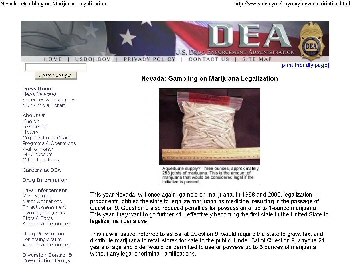Nevada may be on the brink of becoming the first state to vote to end marijuana prohibition. Four years after the Marijuana Policy Project first tried to get over the top in Nevada, the Washington, DC-based group and its local affiliate, the Committee to Regulate and Control Marijuana (CRCM) have a poll showing victory to be within their grasp.

According to internal polling results released last week, when potential voters were read the actual ballot language and asked if they would vote for the marijuana initiative, 49% said they would while only 43% said they would not. That poll, conducted by a nationally-known, California-based polling firm, contradicts one by the Reno Gazette-Journal days earlier that found the initiative losing by a margin of 37% to 55%. A Las Vegas Review-Journal poll Tuesday had the initiative losing 42% to 51%.
"The polls jibe," said CRCM campaign manager Neal Levine. "The Reno Gazette-Journal poll asked if people favored the legalization, use, possession, and transfer of marijuana, while our poll used the actual ballot language. The explanation of the difference lies in the wording of the question asked. The Review-Journal poll, while it shows us behind, shows a huge upward trend over their last poll. Their language wasnât as slanted, but it still didnât ask the question voters will be asked on the ballot. What is consistent is that the campaign is trending up," he told the Drug War Chronicle.
"What we've said all along is that the polls have us about even," Levine continued. "That means we have a real shot now, and we're going to need all our people to register and turn out to vote. We will be campaigning hard," he vowed.
"We're running a very aggressive campaign," said Levine. "We have a very detailed and layered plan, which we're already in the process of rolling out, and we're very excited about our chances. We have new web animation that explains the initiative in clear terms, we have a way of virally spreading our stuff using Youtube, we have home phone banking. We're the subjects of a documentary film, and part of what we get from that deal is that the filmmakers are providing weekly webisodes. The first one goes up Friday," he said. "We're also releasing our first web TV commercial this week. And we've got a bunch of stuff rolling out over the next few weeks."
If the campaign is trending up, the opposition is gearing up. Opponents of the measure organized as Nevada Coalitions Against Marijuana have begun lining up opponents, including the Clark County (Las Vegas) commission; the Las Vegas, North Las Vegas, and Reno Sparks chambers of commerce; and the Nevada AFL-CIO. But the heart of the opposition appears to be the Nevada law enforcement establishment. Clark County Sheriff Bill Young, Las Vegas Metropolitan Police Department Detective Todd Raybuck, and Las Vegas Metropolitan Police Department Lieutenant Stan Olsen were, for example, the prime movers in getting the Clark County commission to approve a resolution condemning the measure.
But that move may have gotten them and the commissioners in trouble. Nevada law bars public officials from advocating for or against ballot initiatives, and when CRCM got wind of the meeting, several dozen supporters led by Levine showed up to remind them of the law. "According to Nevada Revised Statutes 281.554, government officials and employees are prohibited from expending public funds, time, or resources to oppose or support a ballot question," Levine said in televised confrontation with the commission. "This rule applies to the Clark County commission." The commission ignored Levine's complaint, and then passed the resolution.
"The Nevada statutes are pretty clear. Once an initiative is on the ballot, public officials can't use government resources to advocate for or against it," Levine explained. "When the Clark County commission, acting on the request of the sheriff, put a resolution opposing our initiative on the agenda, we showed up to tell them it was illegal, but they did it anyway. They broke the law."
CRCM filed a complaint with the Nevada Attorney General's Office, which is now weighing it. In the meantime, CRCM has used the whole episode to garner even more press. "From a politics standpoint, we used them breaking the law to come out and oppose our initiative to get our message out. That story was covered by the media all over the state."
CRCM was able to do the same sort of political ju-jitsu with the visit earlier this month of Office of National Drug Control Policy head John Walters. Although his trip to Nevada was ostensibly for other purposes, Walters spoke out against the initiative and even gave out the web address for Nevada Coalitions Against Marijuana. "I got an op-ed printed in the Reno paper and the Las Vegas weekly criticizing Walters for coming out here and wasting the taxpayers' money to advocate against a state initiative," Levine said.
Now, with little more than a month to go to election day, the campaign is getting serious on both sides. CRCM is poised to win a historic victory, but it looks like this is going to be a nail biter on election night.
Comments
Michigan Next?
Please try to end marijuana prohibition in Michigan!
Will any of the other states fall in line behind Nevada??
If it is legalized in Nevada, and perhaps Colorado -- would other states possibly start falling in line as well? That is if Nevada passes it, and the rest of the country has a chance to see the benefits of why Nevada did pass it.
I live in Louisiana, and I'm wondering how my state would move towards/or against passing it. Gambling is legal here, and we do not have any parishes (counties) that are dry here - I would like to think Louisiana wouldn't be far behind in legalizing as well..
Any thoughts on which states (after Nevada, Colorado, Alaska) would be in line next?
Add new comment